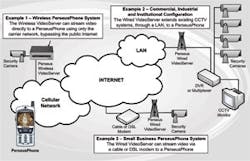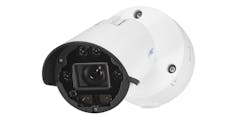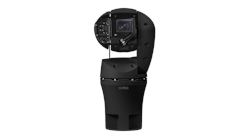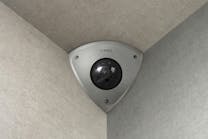Perseus Wireless: Mobile Access to CCTV
With the development of alarm systems, property owners/renters gained a sense of comfort, realizing that their property had protection. Sensors strategically placed along the building's perimeter and inside maintained security and would notify the residents if security was compromised.
However, these systems provide only partial security; they can not identify who or what caused the alarm to trigger. Once the alarm triggered, either the police or a private security person would have to go to the location and visually inspect the premises to determine what triggered the alarm.
As a result of responding to false alarms, many police departments no longer investigate automated alarms. If they do answer the alarm, it is considered low priority with a response measured in hours, not minutes. In addition, many police departments charge the business when the alarm turns out to be false.
To resolve this issue and to observe properties remotely, Perseus Wireless developed "The PerseusPhone," a standard wireless mobile telephone that has the added capability to receive the video stream being captured by security/CCTV camera(s) without needing a wired connection. This means the end-user can actually see what is happening from just about anywhere in the world at anytime without having to go there.
The Perseus Wireless system is compatible with any an analog video camera, VCR or DVR that has a video output source. A simple way to identify an analog video source on electronics gear is the presence of an RCA video output connector. The video source is connected to the "box" or Perseus video server. The box changes the signal, transcoding it from analog video to digital video in MPEG-4 format. MPEG-4 digital video is real-time, full-motion video. The PerseusPhone is capable of viewing digital video in MPEG-4 format through cellular data networks.
The PerseusPhone works with the Cingular wireless network. At the present time, three models of the PerseusPhones are offered: the Nokia 3620, the Sony Ericsson P900 and P910. These mobile telephones are compatible with Cingular and old AT&T services using SIM (Subscriber Identity Module) cards. A SIM Card is a small printed circuit board that must be inserted in any GSM-based mobile phone when signing on as a subscriber. It contains subscriber details and security information. The card is a small plug-in type, about a half-inch square. Most important, the SIM card stores data that identifies the caller to the network service provider.
The PerseusPhones are standard mobile telephones that can be used for both voice and data services. Additional software allows them to receive the digital video signal and display it on the handset Liquid Crystal Display (LCD). PerseusPhones are only sold through the Perseus dealer network.
Important: Perseus has developed security software that is designed to connect each telephone with a specific server or group of servers, ensuring that only authorized users can connect to a system.
There are two models of Perseus Servers, a wired and wireless server. The wired server requires a direct Ethernet connection to the Internet. This requires a DSL modem, cable modem, or corporate local area network (LAN). The wired server does not require a SIM card to operate. However, a SIM card is required for the PerseusPhone. Since most installations are in a fixed location, there is no need for a wireless server.
The wireless server connects directly to the Internet using a General Packet Radio System (GPRS) modem. GPRS modems allow data transmission on the GSM (Global Systems for Mobile) communication cellular networks such as Cingular. The wireless server requires its own SIM card in addition to the SIM card required for the PerseusPhone. The wireless server is useful when the location under video surveillance does not have an easy way to gain a wired connection to the Internet, for example a location in a remote rural area. In addition, the wireless server can be set up quickly with any wiring for use in mobile surveillance applications.
Note: Perseus recommends that a test cell phone be used at the wireless server location to ensure that the signal strength is sufficient.
The two servers are designed to operate with most security/CCTV cameras. Before purchasing any video camera, determine the application. The application will determine the type of video camera required. For example, if you want to see a person at a door, the camera should have an appropriate focal length to provide a clear image of the face or the desired portion of the person at the door. If the need is to observe a large parking lot or a factory, the focal length may be significantly different. Know the application prior to purchasing the camera.
The quality of the camera will reflect on the image observed on the telephone.
The Perseus Servers each handle one video input. If there is more than one video camera, using a multiplexer or commercial surveillance Digital Video Recorder (DVR) allows you to do a tour that cycles through the different cameras. Depending upon the DVR, cycle times are adjustable. Nuvico, a DVR manufacturer, and Perseus have partnered to enable the Perseus Phone to choose which camera will output to the PerseusPhone. Using a list, the Perseus Phone can choose which video camera's image will be streamed. The system can deliver video at up to 15 frames per second depending upon the connection.
Perseus Wireless has a Technical Help Desk, telephone 877-819-6028, available Monday-Friday 7 a.m. to 5 p.m. West Coast time.
For more information, contact your local Clark Security Products office or Perseus Wireless, 4775 Viewridge Avenue, San Diego, CA 92123. Telephone: 866-723-4348. Fax: 858-277-2609. Email: [email protected] Web site: www.perseuswireless.com.
For those locksmiths interested in mobile access to security/CCTV cameras, go to the Perseus website and register. In addition to technical support, seminars are held periodically around the United States that provide technical as well as sales education.
Thanks to Doug Hoffman, vice president of product management for Perseus Wireless.






